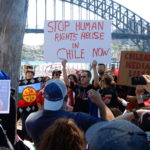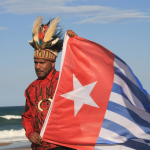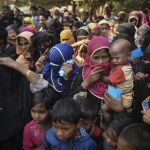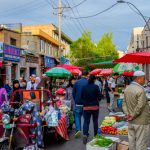The Injustice in Chile Continues: An Interview With Pinochet-Era Activist Paula Sanchez
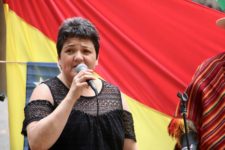
After more than two months of protests, the mass movement of grassroots Chileans calling for system change continues. And while the nation is often held up as a beacon of economic prosperity, those demonstrating are the overwhelming majority, who don’t see any of the benefits.
That’s why, back in October, high school students began protesting at subway stations over a fare price hike. The rise was only set to be a 4 percent increase in ticket fees, but for those doing it tough, that was going to be felt.
And soon, the sentiment of the youth spread as deep seated societal issues around economic inequality boiled over. And by the end of October, literally millions of Chileans were mobilising, which, in turn, spurred the reigning Piñera government to violently crackdown upon them.
The brutal tactics that the military and police have been employing have since led the UN to call for perpetrators to be brought to justice. At least 26 people have lost their lives at the hands of security forces, while well over three hundred have been shot in the eye with lead pellets from riot guns.
A nation traumatised
Yet, this is not the first time the nation of Chile has experienced such unrest. On September 11 1973, a military coup backed by the US Nixon administration, overthrew the democratically elected Allende government, and established the repressive dictatorship of Augusto Pinochet.
The severity of the Pinochet-era is notorious. The general oversaw the extrajudicial killings, torture, kidnappings and disappearances of a documented 3,428 people. Most of which took place between the years of 1974 and 1977.
But, despite his oppressive rule, Pinochet is credited with the economic wealth the country has come to, as he brought about free market reforms, prior to the end of his rule in 1990. And indeed, protesters today are quick to point out that the grave inequalities are also part of his legacy.
A life-time activist
In the late 1980s, Chilean born Paula Sanchez came to Australia with her family on the advice of the human rights commission in her homeland, as the politically active teenager had come to the attention of the Pinochet regime.
Ms Sanchez was only 5 when the coup happened, but she remembers the destruction of the 1973 military takeover. And by the time she was 13, Paula took it upon herself to help start a young women’s revolutionary group, which eventually led the secret police to detain and torture her.
These days, when she’s not lecturing in nursing at Western Sydney University, or working on her PhD, Ms Sanchez is still taking to the streets calling for change. Most recently, of course, she’s been active in local demonstrations about what’s happening back in her homeland.
Sydney Criminal Lawyers spoke to Ms Sanchez about why the protests continue given the concessions Piñera has already agreed to, what it was like being interrogated by the Pinochet regime, and whether she sees the current movement succeeding in bringing about equality.
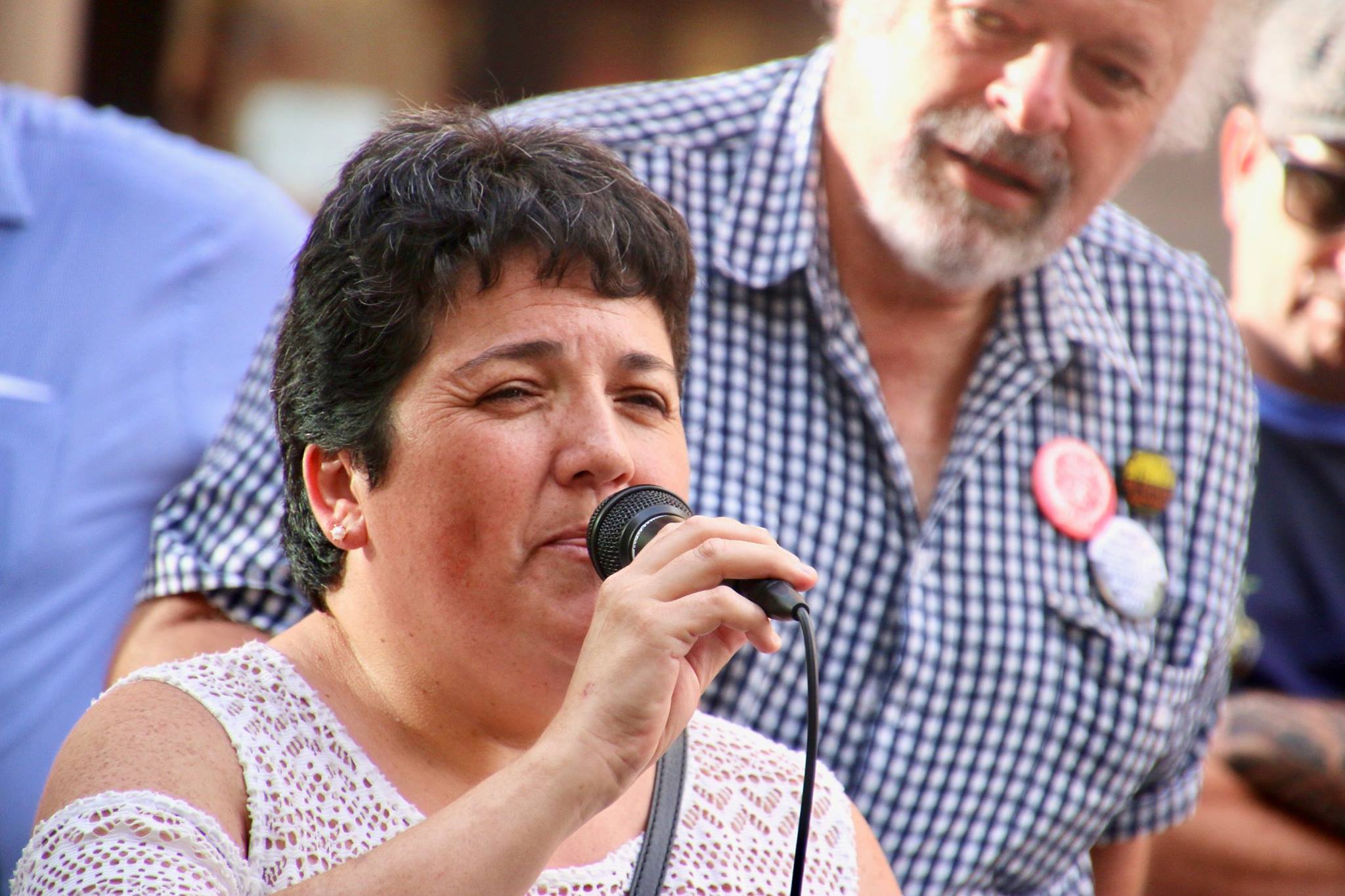
Firstly, protests have been underway in Chile for over two months now. And Chilean president Sebastián Piñera has promised many reforms, including the rewriting of the Pinochet-era constitution.
Ms Sanchez, why are the protests continuing, considering the president has suggested he’s bringing about change?
People don’t believe it. They don’t think that the government is going to make the real democratic changes that people want. People want a completely new constitution. They want a new constituent assembly.
There was a proposition from the government for a vote on a new constitution. And that involved five or six questions. It happened the weekend before the one that just passed.
Most people didn’t vote, because there were details that said if they did vote for the new constitution, it would be written by the same government that exists now. People don’t want that. The people want to write the constitution themselves.
Many Chileans have formed communal committees. Hundreds of organisations are beginning to form. They’re not registered. But, they’re the ones that are leading the people at the moment. They’re the ones calling for protests and strikes. They’re people from the people for the people.
They are not from the government. The government is trying to trick them into having them write the new constitution next year. They’re trying to give them some hope. But, at the end of the day, that’s not what people want.
The people want a complete change of government. And they want a completely new constitution, not just a reformed one.
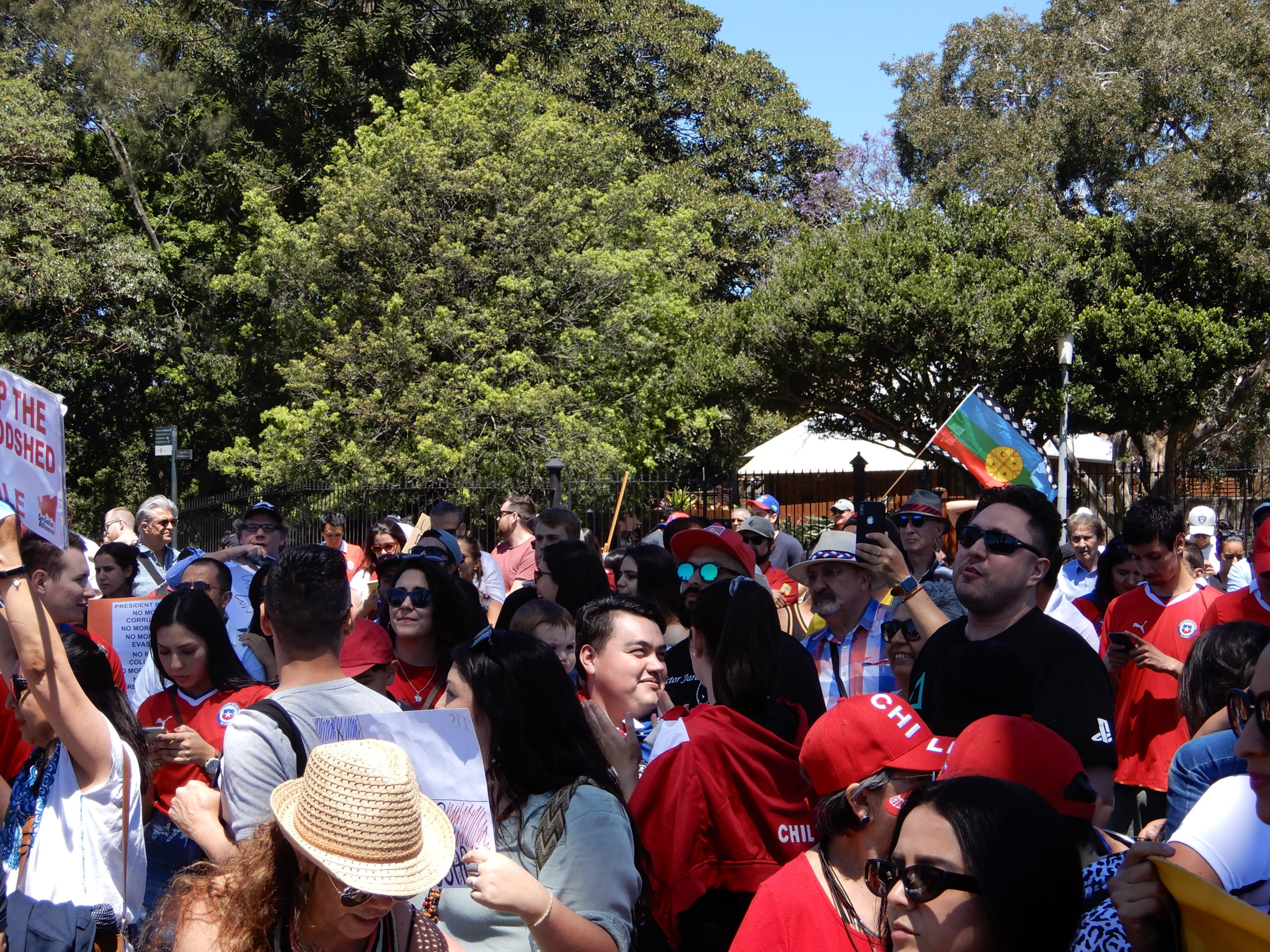
As a politically active Chilean in Australia, who was once a well-known young activist back in Chile, how did you feel when you saw over a million Chileans take to the streets of Santiago on 25 October?
I felt happy. But, it was something I knew was coming. I felt the people in Chile were very patient for many years. We’ve been saying, “Come on, Chile. Wake up. Stand up. You need to fight.”
Even though on the surface Chile looked like a very rich country, underneath people were suffering. People are saying it’s for the last 30 years, but it’s a lot more. Before it was the dictatorship.
But, after that the inequalities actually got worse: health, education, and pensions. They’re the main issues people are complaining about.
There were lights already shining on this. There were the student protests. They were on strike for about seven or eight months. It started in 2006. It involved high school students out on the streets. They actually stopped going to classes. And then in 2012, they did it again, when they stopped for a month.
Nothing happened for a while, but two or three years after that Michelle Bachelet did actually include some reforms for the students. They didn’t get everything they wanted, but they got some changes.
So, the students have been doing these things. And this now, is something that I saw was coming. This was something deep in the society. It needed to happen eventually.
Back in October, the Piñera government began a brutal crackdown upon those calling for reform. Ms Sanchez, you grew up under the Pinochet dictatorship. Are the issues Chile is facing today linked to those days of your childhood?
They’re the same issues. At the time of the regime, we were protesting for the same inequalities, but also for the repression.
In October, people were protesting just because of inequalities. People were not protesting because of repression. But, now they are, because the repressions happened.
And so, it’s very similar. I feel the repression is a lot more now, than back in my time. We suffered a lot. And there were lots of people going on the streets. But, not in the millions like now.
Perhaps this is to do with social media. Maybe it has changed how the world sees things, because we see everything.
We’ve seen horrible things on social media, with the videos that people have been posted. These have shown the teargassing and people being beaten. We’ve seen it on these videos. And it’s horrible.
It is so open. There was a place at the train station that they were using to take people to torture them, and there are videos of that. There are videos of women being tied up. Everyday there has been something. And I have to turn my internet off, because it’s just so painful.
There are lots of similarities in the repressions. And lots of students have been saying this.
There’s one video of a young man, who’d just been tortured. He said that his parents had told him about this. He said he thought it was all history. But, now he believes them, because it had happened to him.
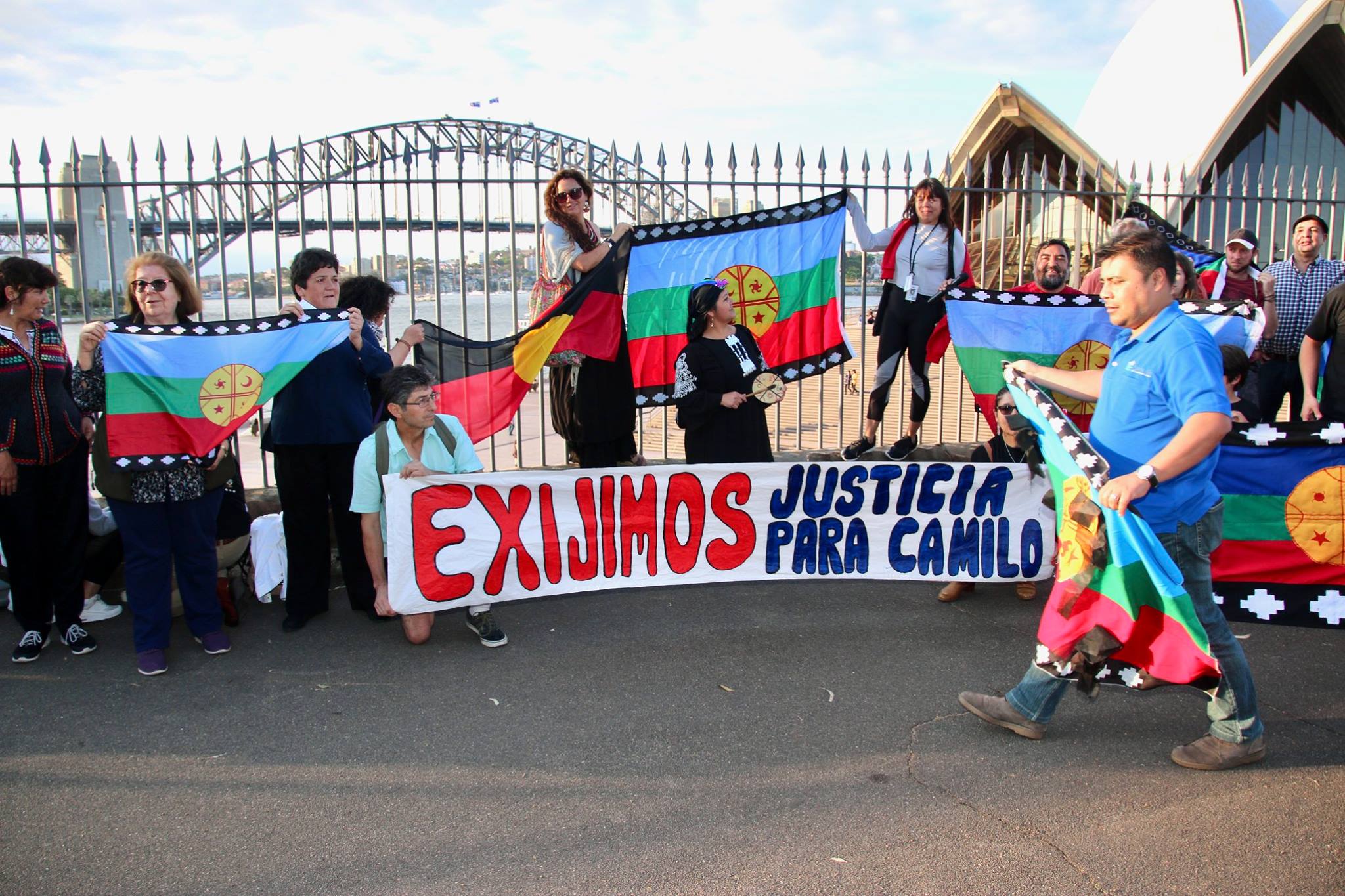
You were very young when Pinochet took over Chile in a brutal US-backed military coup. But, by 13, you were helping form a young women’s revolutionary group. What did that involve? And what were your aims?
I became part of an organised political party. There was nothing happening in the city. So, I became part of the Youth Communist Party of Chile.
We organised things like throwing pamphlets in the street or graffitied anti-government phrases, making people aware of what was happening.
We were trying to stir people up. I remember we put banners on a very well-known bridge. It was all illegal. And anybody who did it could be detained.
It was about starting to make people aware and believe in a different system. We were very repressed under the regime. My mother was a teacher. My father had different jobs. And we would see the injustices.
But, many, especially the older generation, were scared, because they had seen what had happened, during the coup time. The people were killed. They were sent to the detention centres.
So, people were very scared about going on the streets. And the first people who took to the streets were women in Santiago. Just to show people what was happening. And how people were being disappeared. It happened in Chile, in Argentina and in Uruguay.
That was our purpose. And then we became more serious, because we were older. But, we were talking about education. We were talking about health. And we were doing protests.
But, in 1987, your agitating against the regime led to you being taken into custody by the CNA: Pinochet’s secret police. What happened to you in detention? And what were your captors trying to achieve?
At first it was interrogation. But, then I was in gaol for two months after. With them, it was about finding out who was involved with us – who the people were, their names and addresses. They just wanted details and to investigate more. And that was the torture and the interrogation part.
I never told. I never told them anything. We were already organised. We were people who were passionate about what we were doing. I did know people – it took many years – but eventually they had an organised armed group.
They didn’t do armed actions at first. They were stealing things from the government, like trucks of chickens. And they would take them and deliver them into the towns and the suburbs. Then they became more organised. And later on, they became armed.
I wasn’t. I just knew people who were. And that was the main purpose of the police. They wanted to know more. They were trying to uncover this organisation. They had this idea that we were local organisers and they were somewhat paranoid.
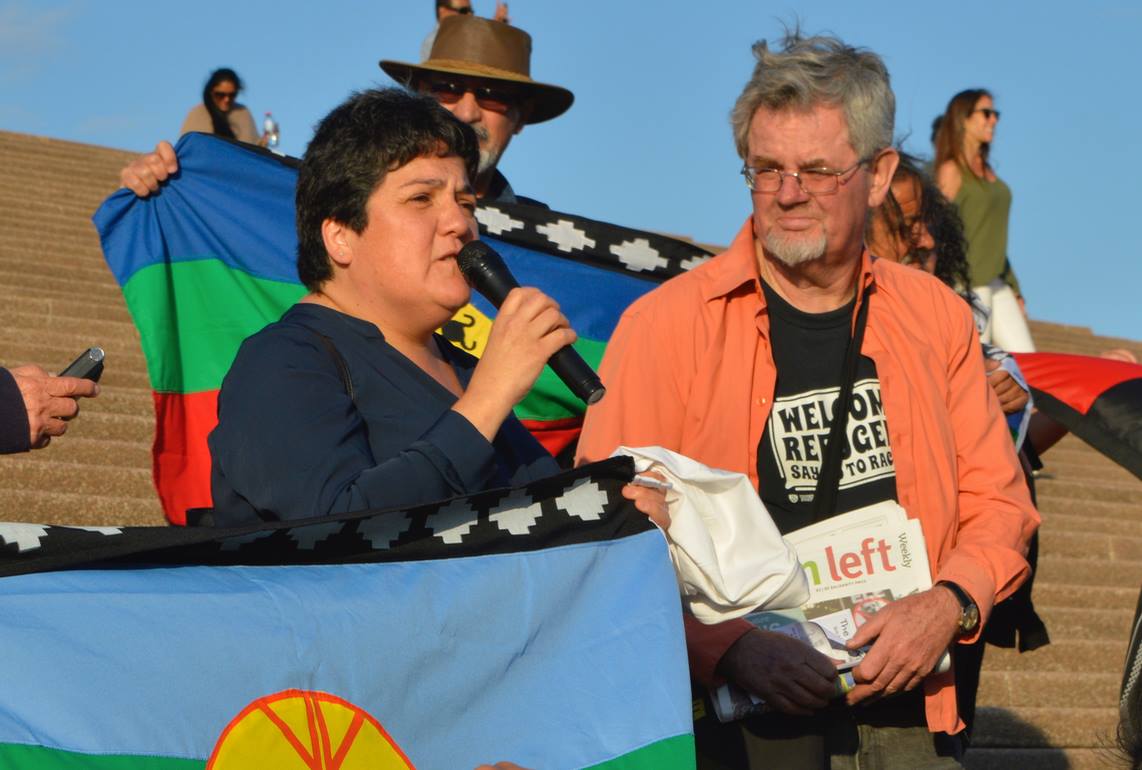
So, you ended up spending two months in prison?
Initially, they put me under the military court. And they were trying to say that I had weapons. But, I had nothing. Although, very often they planted weapons on people. And they tried to do that to me, but I was lucky enough that it didn’t happen.
In the end, they didn’t think I knew anything. I’m a good actor. I made up stories, so they didn’t think I knew much. Then I was processed into the civil court and I was in gaol for two months. Then I was on parole and signing in for months after as well.
But, I was lucky that I was not one of the disappeared. I was quite involved with the Catholic Church and the human rights commission.
My mother was also involved with the teachers’ federation. And she was linked to the president of the region. So, they knew a lot of people.
When they took me, my mother went to the federation and some of them worked for the human rights commission. They immediately went and put out a protection order on me.
My father went with an official to the place where they were detaining me. They went there to demand that they let me go. And the police said that I was not there. Of course, at that time, I was being tortured inside.
My mother went to the paper immediately. So, the morning after I was taken, I was in the paper. It said that a student had been kidnapped. And it mentioned the car and its registration, because my sister had actually seen it. So, it came to public attention very quickly.
I imagine that helped me not being detained for longer. And then being released into the gaol, so I appeared in public. I was lucky. My parents did the right thing and stirred it up in the right way.
A friend of mine was tortured and she had nothing to do with politics. She was the girlfriend of one of the leaders. And she was taken, disappeared for seven days, and then she was thrown out somewhere in the desert.
I met her after this happened. And she was terribly damaged, because they’d tortured her for days, because of the boyfriend that she had. It was terrible, the way that she was. And it continued to happen. She would wake up screaming in the middle of the night.
But, after that, she got involved. She said the only thing that she could think of to do was to get involved, after what they’d done to her.
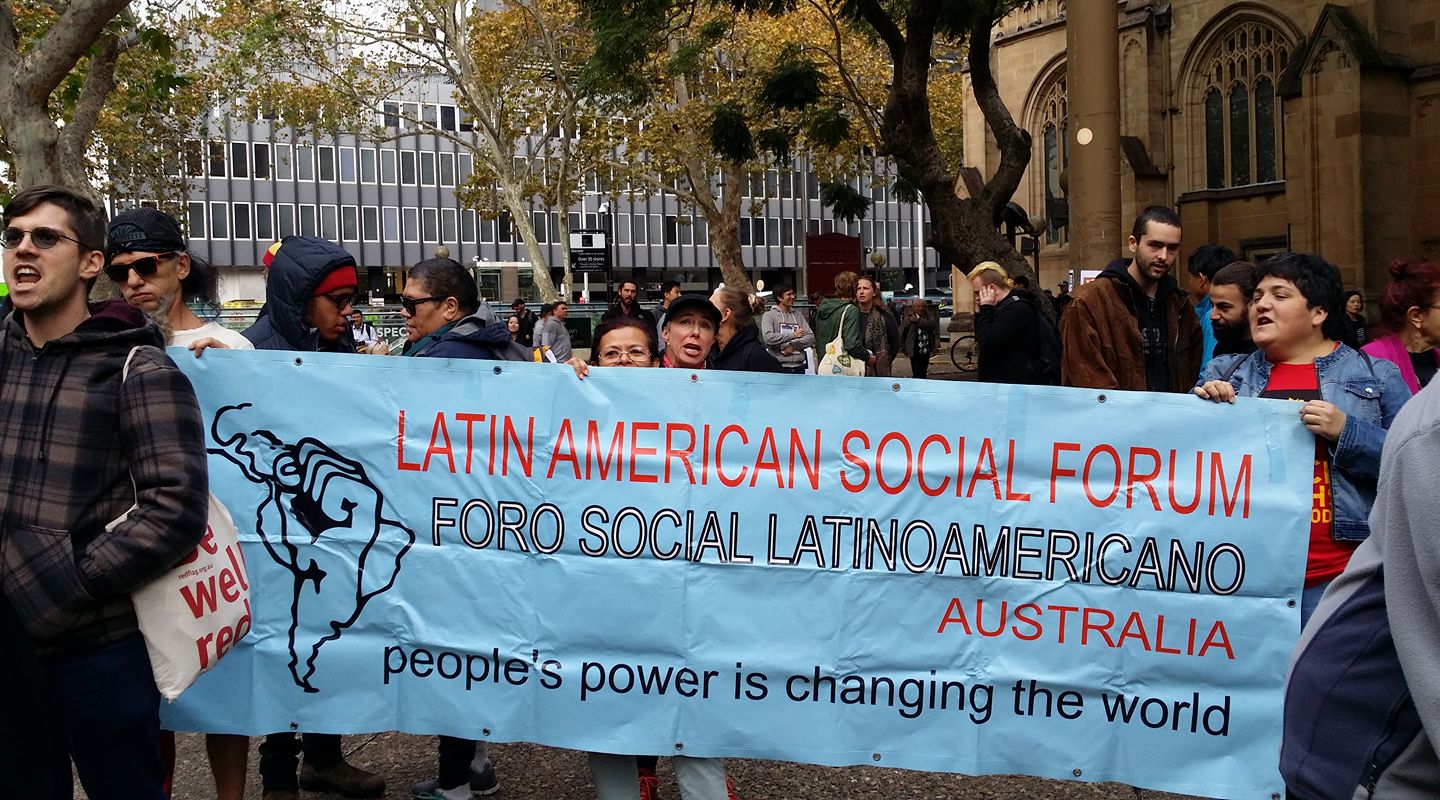
Turning back to the present, Chile is set to vote on a new constitution next year. However, last week, legislators voted against guaranteed gender parity and Indigenous representation. What are your thoughts on these developments?
That proves my point: that all of this is just bullshit. They want to write what they want to write. They don’t want to let the people do it themselves. They want to impose what they want to do with the constitution.
It makes me feel very angry. After all that’s happened, they’re not honestly going to give it to the people to do. They want to do it themselves under their own conditions.
There are definitely some politicians against what’s happening, but they’re in the minority. They’ve sent letters to the United Nations. They want to impeach Piñera for crimes against humanity.
But, nothing has happened so far. It’s been 65 days with people on the street. We know that they’re using acid in the water. That’s why people have burns on their skin. We know that they’re shooting people in the eyes.
You see the videos. You can see the powder on the floor after they throw the water at the people who are protesting. You can see the water sort of boiling on the ground with the chemicals. And nothing has happened.
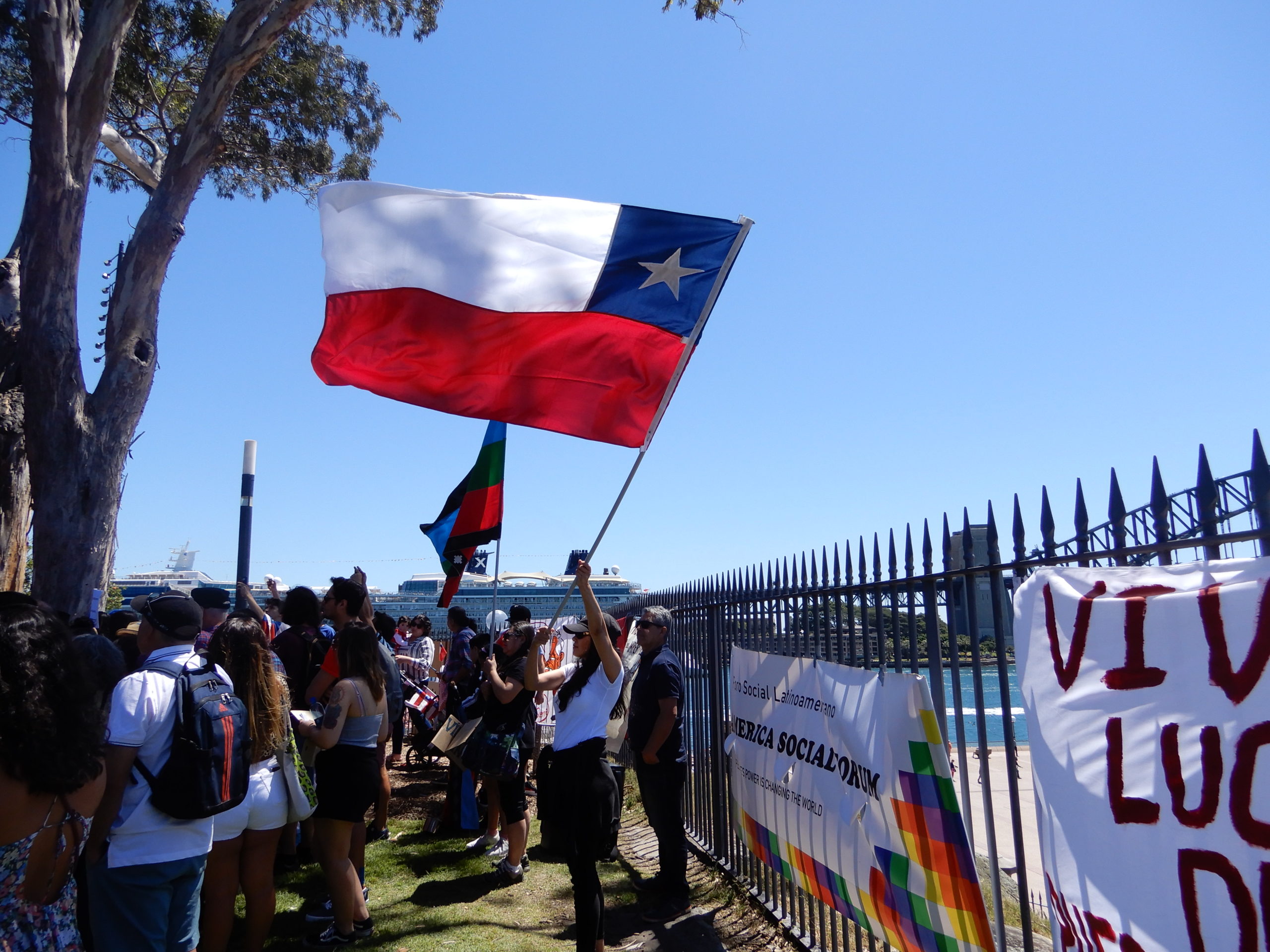
And lastly, Ms Sanchez, how do you see this all playing out from here? Will this uprising finally bring about greater economic justice for Chilean people?
I have my doubts. I really have my doubts. I wish it was yes. I’ve seen from the outside, 65 days of people being on the streets and being abused, but nothing has happened.
The government is just sitting. Nobody has moved. Nothing has changed. They’re being very quiet.
They keep sending the police and the military in. And the marines in some cities. They’re doing the things they want to do to the people. But, the government is very quiet about it.
I see it as some sort of plan. Like in Bolivia recently, with the coup. And very recently, there was something that happened in Ecuador as well.
It seems like it’s a bigger plan. And those in power are being protected and supported. We know that the CIA had a lot to do with what happened in Bolivia. And we know they were involved with what happened with Pinochet.
The international companies, and the people that own the majority of Chile – those who own the water, the streets, the roads – they’re not going to let the money go.
There is this economic thing going on as well. The rich people in the country and the companies that are getting something out of Chile, they’re not going to let it go so easily.
They do have the military support of the army right now. There have been some people in the army who’ve decided not to participate. But, these are not the higher ranks. These are the lower people, who have decided not to shoot. And there have been some military that have been disappeared.
It happened in Bolivia. The ones who decided not to shoot at the people, more than 100 were let go. They were sacked from their jobs.
I hope there’s going to be a big change. I’m proud of the people who are fighting. Those who have been shot and have been losing their eyes. And they’ve taken many people. They’ve taken thousands.
I wish it would change. But, the cost is high. So far, I don’t think there has been any military injured. I wish it would change. And people are hoping it will change across Latin America.
But, while the future looks grim to me, I hope things get better.


